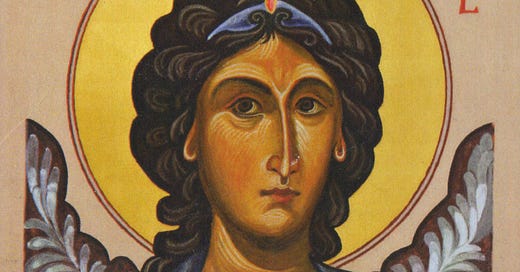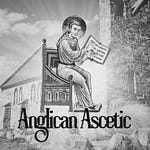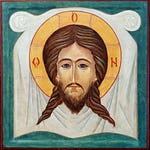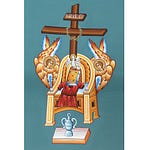[Note: the audio recording above will vary in places from the prepared text below.]
It has become cliché in our days for preachers to observe that among the myriad aspects of the Christian faith and religion, that the angels are among the most misunderstood of all, if not the most misunderstood. And while there are many superficial reasons for that (such as how angels are depicted in motion pictures, television, gift shops, lawn and garden stores – depicted, of course, incorrectly), the ultimate reason for the misunderstanding that surrounds the angels is that human beings and angels are different orders of creation. Creation is a hierarchy, the three orders of which are the visible, the invisible, and the heavenly.
In the visible order, human beings are the highest of God’s visible creatures, the most sophisticated and most self-conscious (meaning “conscious of self;” with certain exceptions, we do not understand other animals to possess a great deal of what we call self-consciousness, and this is a great distinction between humans and other animals). And within visible creation, from the stars to animals and vegetation, land and sea, as well as to the microscopic, we humans can see these things, and therefore can begin to try to understand them with precision (or, think we do).
Yet if creation is a hierarchy, this visible order for all its wonder, splendor and complexity, is the lowest. Next up the hierarchy is the invisible, and above that is the heavenly order; it is in both these orders that the angels reside. Our burial liturgy affirms our belief that angels take the souls of the faithful departed through the gate of death and into the next phase of life in Christ. Scripture also tells us that certain angels are eternally surrounding the throne of heaven singing “Holy, holy, holy.” Angels are bodiless beings; Scripture tells us that certain angels it seems can temporarily take on the characteristics of human beings, at least in terms of bodily manifestation. Jacob wrestled with an angel; angels appeared to Abraham and Sarah; and depictions of the Annunciation to Our Lady, Blessed Mary, always give Archangel Gabriel a human form. But this is not their true nature, which is bodiless, and moving between the invisible and heavenly orders of creation, and invisibly interacting with the visible order in which we reside.
All that said, while angels are not completely ungraspable to us, angels are for the most part quite obscure. The bit we can understand about angels in fact entirely comes from Scripture. And that is a point worth not overlooking. Whatever truth we grasp about Angels only comes through thinking scripturally. And Scripture provides us ample food for thinking about angels. Angels are in the first pages of the first chapters of the first book of the Bible, and in the last pages of the last chapters of the book of the Bible. To celebrate Michael and the Holy Angels today is really to celebrate Scripture, because in Scripture angels are everywhere. In the words of Saint Augustine of Hippo, Church Father who died in the year of our Lord 430, “Holy Scripture descended to us through the ministry of Angels.”
And what angels are doing throughout Scripture can be summarized this way: Angels are charged by God with the responsibility of conveying to human beings the certitude in the personal reality of God with Whom a relationship can be established. This is what the angel was doing with Abraham and Sarah; this is what the angel was doing with Jacob; this is what the angel was doing with Blessed Mary; and furthermore, this is what angels were doing with the women at the Tomb early morning on the first Easter Sunday. Each of those episodes have differing content; but what is consistent throughout is that Angels were trying to give those people certitude in the personal reality of God with Whom a relationship can be established. It was an angel, I think we can say, that allowed Nathanael to recognize Jesus as the Son of God, the King of Israel: and so Jesus was led to say, Angels will show you even more than that – much more: angels ascending and descending upon the Son of Man!
And so, brothers and sisters, the significance of angels is undeniable. It is because of angels that we can come to know, can come to believe, can come to rest in the truth that we can have a personal relationship with God; angels help us to understand that such a thing is even possible: that we can have an intimate relationship with God; that we can come to our Lord with everything, and He will listen. It is because of Angels that we can truly know that all God wants is the human heart; that our hearts can truly be open to God. It is because of Angels that we can truly know that Communion with God is possible: communion with God in our every day lives through prayer and attention, and of course Holy Communion, which is why, as the Liturgy of the Eucharist begins, we say: Therefore with Angels and Archangels, and with all the company of heaven, we laud and magnify thy glorious Name; everything praising Thee, and saying: Holy, holy, holy. Amen.











Share this post